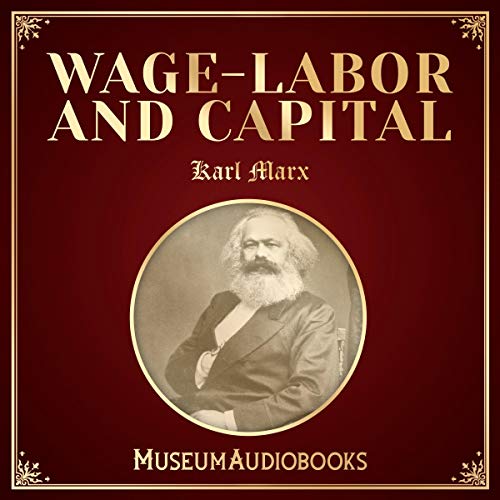Karl Marx’s “Wage Labour and Capital” examines the relationship between labor, capital, and the dynamics of a capitalist economy. This audiobook delves into how wages are determined and the inherent exploitation in capitalism.
Karl Marx’s “Wage Labour and Capital” is a critical work that explores the foundations of economic systems. The audiobook offers an insightful analysis of the labor-capital relationship, shedding light on the mechanisms of wage determination. Marx argues that the capitalist system inherently exploits workers, who receive a fraction of the value they produce.
This exploitation is central to the accumulation of capital and the perpetuation of economic inequality. The audiobook is an essential resource for understanding Marxist economic theory and its implications on modern economic structures. It provides listeners with a thorough grasp of the forces at play in capitalist economies.
Introduction To ‘wage Labour And Capital’
Karl Marx wrote ‘Wage Labour and Capital’ in 1847. This work explains the relationship between workers and employers. It explores how wages are determined and the role of capital. Understanding this audiobook helps grasp Marx’s theories about society and economy.
Marx’s Historical Context
Marx lived during the Industrial Revolution. Factories were common, and many people worked long hours. Workers had few rights, and conditions were harsh. Marx saw this and wanted to explain why it happened. He believed that workers were exploited by capitalists. This context influenced his writing.
Relevance Today
‘Wage Labour and Capital’ remains relevant today. The audiobook explains ideas about work and pay. Many people still face unfair work conditions. Understanding Marx helps us see why these issues exist. It can inspire discussions about fair wages and workers’ rights.
Marx’s Concept Of Wage Labour
Understanding Karl Marx’s concept of wage labour is crucial. It reveals how workers sell their labour. The audiobook “Wage Labour and Capital” dives deep into this idea.
Defining Wage Labour
Wage labour is a type of work where workers sell their labour for money. The worker does not own the product they make. Instead, the employer owns it.
Marx believed wage labour is the root of exploitation. Employers pay workers less than the value they create. This difference is profit for the employer.
Workers depend on wages to survive. They have no other means to live. This dependency creates an unequal power balance.
The Labour Power Commodity
Marx introduces the concept of labour power. Labour power is a worker’s ability to work. Employers buy this ability for wages.
Labour power is a special commodity. It is unique because it creates value. When workers use their labour power, they create goods and services.
The value of labour power depends on the cost of living. It includes food, shelter, and other needs. Employers aim to pay the least amount possible.
| Aspect | Description |
|---|---|
| Definition | The ability to work |
| Value | Depends on living costs |
| Unique Feature | Creates value |
Understanding these concepts helps grasp Marx’s critique of capitalism. Wage labour and labour power are central to his theory. The audiobook makes these ideas accessible and engaging.
Capital Defined
Karl Marx’s work, “Wage Labour and Capital,” explores the concept of capital. It delves into how capital influences wages and labor. Understanding capital is crucial to grasp Marx’s theories.
Origins Of Capital
Marx traces the origins of capital to historical processes. Capital is not just money. It includes resources used to produce goods and services.
Capital begins with primitive accumulation. This involves the initial gathering of resources. Early capitalists collected land, tools, and raw materials. These resources helped create more wealth.
Marx explains that capital grows through exploitation. Workers produce more value than they receive in wages. This extra value, or surplus value, benefits the capitalist.
Capital’s Role In Production
In production, capital plays a key role. It provides the means for creating goods. This includes machinery, raw materials, and labor power.
Marx describes how capital is invested to generate profit. Capitalists buy labor and materials. They then produce goods to sell for more than the cost of production.
Capital also dictates the labor process. Workers must follow the methods set by capitalists. This ensures maximum efficiency and profit.
Marx highlights the continuous cycle of capital. Profits are reinvested to create more capital. This cycle drives economic growth and shapes society.
| Aspect | Description |
|---|---|
| Primitive Accumulation | Initial gathering of resources like land and tools |
| Surplus Value | Extra value produced by workers, benefiting capitalists |
| Investment | Using capital to buy labor and materials for profit |
| Labor Process | Workers follow methods set by capitalists for efficiency |
| Reinvestment | Profits are used to create more capital |
Understanding these concepts helps comprehend Marx’s critique of capitalism. His insights remain relevant in today’s economic discussions.

The Wage System
In Karl Marx’s “Wage Labour and Capital,” the concept of the wage system is central. It explains how wages are determined and their impact on workers. This audiobook delves into the intricacies of the wage system, revealing the underlying mechanisms that govern labor compensation.
Mechanics Of Wage Determination
The mechanics of wage determination are crucial to understanding the wage system. Marx explains that wages are not set arbitrarily. Instead, they depend on several factors:
- Labor Market Conditions: The supply and demand for labor play a significant role. When labor is abundant, wages tend to be lower. Conversely, when labor is scarce, wages rise.
- Cost of Living: Employers consider the cost of living in wage calculations. Higher living costs often lead to higher wages.
- Productivity: The productivity of workers influences wage levels. More productive workers usually command higher wages.
Marx also highlights the role of capitalists in this process. Capitalists aim to maximize profit, often at the expense of fair wages for workers.
Impact On The Worker
The wage system profoundly impacts workers. It creates a dynamic where workers are often exploited. Here are some key impacts:
- Economic Insecurity: Workers face constant economic insecurity. Wages are often just enough to survive, leaving little room for savings or investment.
- Limited Mobility: Low wages limit workers’ mobility. They cannot easily move to better opportunities.
- Alienation: Workers often feel alienated from their labor. They produce goods they do not own or control.
Marx argues that this system keeps workers in a cycle of poverty and dependence. It benefits capitalists while exploiting the labor force.
Understanding these aspects of the wage system is crucial for anyone interested in economic and social justice. The audiobook offers valuable insights into these complex dynamics.
Surplus Value Explained
Karl Marx’s concept of surplus value is a cornerstone of his economic theories. In the audiobook “Wage Labour and Capital”, Marx explores how surplus value is created, distributed, and realized. Understanding this concept is key to grasping Marx’s critique of capitalism.
Creation Of Surplus Value
Surplus value is created through the exploitation of wage labor. Workers sell their labor power to capitalists. They work more hours than needed to produce the value of their wages. The extra hours generate surplus value, which capitalists appropriate. This difference between the value produced and the wages paid forms the basis of profit.
Distribution And Realization
Once created, surplus value must be distributed and realized. Capitalists use various means to distribute surplus value. They reinvest in production, pay dividends to shareholders, and cover operational costs.
The realization of surplus value occurs when products are sold in the market. Capitalists transform surplus value into profit through sales. This process is essential for the capitalist system to function and grow.
Understanding surplus value helps decode the mechanics of capitalism. It reveals the underlying dynamics between labor and capital. Marx’s insights in the audiobook provide a critical lens to analyze modern economic systems.
Exploitation Of The Proletariat
Listening to an audiobook of Karl Marx’s “Wage Labour and Capital” offers a unique experience. The text comes to life with the voice of the narrator. This method of consumption allows for a deeper connection with Marx’s ideas. It’s perfect for those who prefer auditory learning or have a busy lifestyle.
Narration And Interpretation
The narration in this audiobook is clear and engaging. The narrator’s voice keeps listeners hooked. They skillfully interpret Marx’s complex ideas. This makes the content more accessible to everyone.
The tone and pace of the narration are well-suited to the material. Each point is emphasized to enhance understanding. The narrator’s interpretation adds depth to Marx’s words. It helps listeners grasp the nuances of his arguments.
Accessibility Of Marx’s Ideas
This audiobook format brings Marx’s ideas to a wider audience. It’s easier to understand than reading dense text. The audio format breaks down complicated concepts into digestible parts. This makes it ideal for both beginners and seasoned readers of Marx.
Listeners can enjoy the audiobook while commuting or exercising. It fits seamlessly into a busy schedule. This accessibility ensures that Marx’s theories reach more people. It encourages a broader discussion on his ideas.
| Aspect | Benefit |
|---|---|
| Narration | Engaging and clear |
| Interpretation | Deepens understanding |
| Accessibility | Wider audience reach |
| Convenience | Fits into busy schedules |
The audiobook format also caters to different learning styles. Those who learn better by listening will benefit greatly. It’s a convenient way to absorb Marx’s theories without feeling overwhelmed.
- Engaging narration
- Clear interpretation
- Accessible to all
- Convenient listening
The Audiobook Experience
Karl Marx’s “Wage Labour and Capital” is a cornerstone of economic theory. This audiobook version breathes life into his revolutionary ideas. Let’s dive into a critical analysis of this seminal work.
Contemporary Critiques
Many modern economists critique Marx’s theories. They argue his ideas on labour value are outdated. Critics say the global economy has evolved.
- Marx saw labour as the source of all value.
- Today’s economists cite technology and innovation.
- Some argue Marx underestimated market dynamics.
Others criticize his views on class struggle. They say the middle class has grown. Wealth is not just in the hands of a few.
Enduring Insights
Despite critiques, Marx’s work offers enduring insights. His analysis of wage labour remains relevant. He showed how workers are exploited for profit.
| Insight | Relevance |
|---|---|
| Exploitation of Labour | Still seen in many industries |
| Class Struggle | Ongoing in various forms |
| Capital Accumulation | Relevant in economic discussions |
Marx’s critique of capitalism resonates today. His ideas on wealth inequality are profound. Many still study his works for insights.

Critical Analysis
Karl Marx’s “Wage Labour and Capital” remains a crucial text in understanding labor economics. This audiobook version breathes new life into his theories. Reflecting on Marx’s ideas can help us see their relevance today.
Synthesizing Marx’s Theories
Marx’s theories revolve around the relationship between labor and capital. He argues that workers produce value but receive only a fraction of it. This leads to exploitation and inequality.
Marx also introduces the concept of surplus value. This is the difference between what workers produce and what they are paid. The capitalist keeps the surplus, creating profit. This idea is central to understanding Marx’s critique of capitalism.
In the audiobook, these concepts are explained clearly. Listeners can grasp complex ideas through engaging narration. This makes Marx’s work accessible to a wider audience.
Influence On Future Generations
Marx’s ideas have shaped many social and economic theories. His thoughts on labor have influenced political movements worldwide. The audiobook ensures that his ideas reach new generations.
Socialists and communists often draw from Marx’s work. His ideas have inspired revolutions and reforms. Understanding Marx helps us see the roots of modern economic thoughts.
Listening to the audiobook can spark critical thinking. It encourages listeners to question the current economic system. This can lead to new ideas and solutions for today’s challenges.
Educators, students, and activists benefit from engaging with Marx’s work. The audiobook format makes it easy to integrate his theories into various discussions. This keeps Marx’s influence alive and relevant.
| Key Concept | Explanation |
|---|---|
| Surplus Value | The extra value produced by workers, kept by capitalists as profit. |
| Exploitation | Workers receive less value than they produce, benefiting capitalists. |
Engage with this audiobook to understand Marx deeply. Reflect on how his ideas apply today. This can lead to meaningful discussions and insights.

Frequently Asked Questions
What Is “wage Labour And Capital”?
“Wage Labour and Capital” is a foundational work by Karl Marx. It explores the relationship between workers and employers. The text delves into the dynamics of wage labor and the capitalist system.
Who Narrated The Audiobook?
The audiobook of “Wage Labour and Capital” is narrated by various professional voice actors. They bring Marx’s influential work to life. The narration makes the complex theories more accessible to listeners.
Why Listen To The Audiobook?
Listening to the audiobook is convenient and engaging. It allows you to absorb Marx’s ideas while multitasking. Audiobooks make complex texts more approachable.
Where Can I Find The Audiobook?
You can find the audiobook on platforms like Audible and Librivox. These platforms offer high-quality recordings. Some versions might even be available for free.
Conclusion
Exploring Karl Marx’s “Wage Labour and Capital” through an audiobook offers deep insights into labor dynamics. This classic work remains relevant, highlighting the struggles of workers. Listening to this audiobook can enrich your understanding of economic theories. Dive into Marx’s analysis and gain a fresh perspective on wage labor today.



